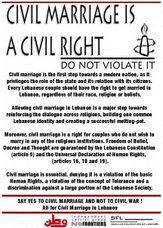
Civil marriage and religious marriage are different institutions, but are often confused with each other. Unlike some religious definitions, civil definitions of marriage do not usually mention childbearing, sexual relations, living arrangements, or religious beliefs or observance.When clergy or congregations marry couples it is a religious rite, not a civil ceremony, although the government may recognize it. Clergy and congregations choose whom they marry. They aren't compelled to accept the state's marriage definition, and indeed, many religious institutions don't accept it.
Many religions have extensive teachings regarding marriage. Most christian churches give some form of blessing to a marriage; the wedding ceremony typically includes some sort of pledge by the community to support the couple's relationship. Religious communities widely hold marriage as a relationship uniquely allegorical to God's relationship with the people; the husband represents God and the bride represents the whole of God's chosen people.
Liturgical Christian communions—notably Anglicanism, Catholicism, and Orthodoxy—consider marriage (sometimes termed holy matrimony) to be an expression of grace, termed a sacrament or mystery. In Western ritual, the sacrament is bestowed upon a husband and wife by the spouses themselves, with a bishop, priest, or deacon normally witnessing the union on behalf of the church. In Eastern ritual churches, the clergyman functions as the minister. Western Christians commonly term marriage a vocation, while Eastern Christians term it an ordination and a martyrdom, though the theological emphases indicated by the various appellations are not excluded by the catechetical teachings of either tradition. Marriage is commonly celebrated in the context of a Eucharistic service (a nuptial Mass or Divine Liturgy). The sacrament of marriage is iconic of the relationship between Christ and the Church. While most Reformed Christians would deny the elevation of marriage to the status of a sacrament, nonetheless it is considered a covenant between spouses before God.
In Judaism, marriage is viewed as a contractual bond commanded by God in which a man and a woman come together to create a relationship in which God is directly involved. Though procreation is not the sole purpose, Jewish marriage is also expected to fulfill the commandment to have children. The main focus centers around the relationship between the husband and wife. Kabbalistically, marriage is understood to mean that the husband and wife are merging together into a single soul. This is why a man is considered "incomplete" if he is not married, as his soul is only one part of a larger whole that remains to be unified.
Islam also recommends marriage highly; among other things, it helps in the pursuit of spiritual perfection.
(www.wikipedia.com)
Islam also recommends marriage highly; among other things, it helps in the pursuit of spiritual perfection.
(www.wikipedia.com)




2 comments:
Your site is great! Keep it up, Sandra
buy tramadol india tramadol for dogs dosage usa - tramadol online overnight delivery
Post a Comment